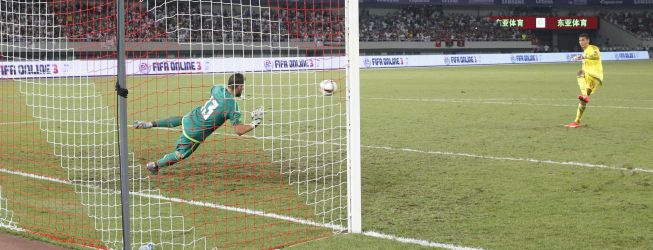The Madrid wins the Asian version of the International Champions Cup
The Madrid wrapped up its planetary tour by winning the Asian version of the International Champions Cup and listing its certainties in the sauna of Shanghai. Benitez must conclude that Danilo has not gained any advantage over Carvajal, that Casemiro has confirmed his status as the third man in the midfield, that Casilla has made a much better impression than Keylor, and that Isco and Jesé have blurred the boundary between the non-negotiables and the non-negotiables. With both, Madrid has been much better than without them and they demand a review of the hierarchy. Plan B starts to blend with plan A.
The Euroclásico in the heat of Shanghai left a Madrid with less inventiveness and less energy at the beginning. Both explainable. Benitez spared Isco and James to bring in a winger, Lucas Vázquez, and kept Bale as the attacking midfielder. Preserving the privilege of the Welshman (seven players have scored in this preseason and he has not been one of them) did not work. And the general paleness was helped by the 40º conveniently mixed with a devilish humidity that paralyzed the footballers. Especially those from Madrid. Because the new Milan of Mihajlovic, which is no longer the empire that Ramón Mendoza admired, offered a more robust image than its neighbor Inter. It conceded less at the back, guarded its backs well, tactically disguised its technical inferiority, deactivated Madrid's midfield, and at times, pressed up with the athletic Niang, who tested and repeated against Varane and Danilo.
Danilo started again without outperforming Carvajal. He has the uproar of the Brazilian full-backs, but for now, he has not offered precision or forcefulness. He will need more time. Modric, recovering from some discomfort, also did not handle the game board with his usual fluency, and Casemiro was too timid.
Benitez started with the BBC and found out once again how difficult it will be to get the trio involved in pressing and regaining possession. At times, that shattered Madrid reappeared, which suffered so much in the past. And in attack, they were not the nuclear arsenal that was presumed either. It was, therefore, a post-war Madrid that needs Isco, whose football is not only commercial but also contagious and effective. The first half evaporated with two not too demanding interventions from Keylor and a general dullness in which Milan felt more comfortable, despite saving their best players for the second half.
But the best from Madrid also came on after the break and that's when the real game started. Kroos took the team out of their monotony by varying the short and long game, Jesé offered hyperactivity and space-playing that Benzema currently lacks, and Isco put the rest: skill, intelligence, composure, and even scoring ability. Together, they also lifted Cristiano's spirits and showed Bale in better form. Then Madrid pressed down on the best possible Milan, with Bacca at the helm. The Colombian gave Casilla the first opportunities to shine, first with a cheeky save with the wrong hand and then instinctively saving an almost one-on-one situation. But the best chances were for the whites. Zapata saved a shot from Kroos, Bale missed the target, Isco fooled the tough De Jong with two feints and his cross was blocked by Cristiano's legs, Isco himself didn't shoot a rebound because the ball came above his waist. Then the penalties arrived, with few mistakes and Milan placing their hopes on a 16-year-old goalkeeper, Donnarumma. It went on for so long that it was resolved in a one-on-one between the goalkeepers. And there, Casilla won, scoring his penalty and stopping the juvenile's. His right foot decided it, the same foot with which he entered Madrid.

